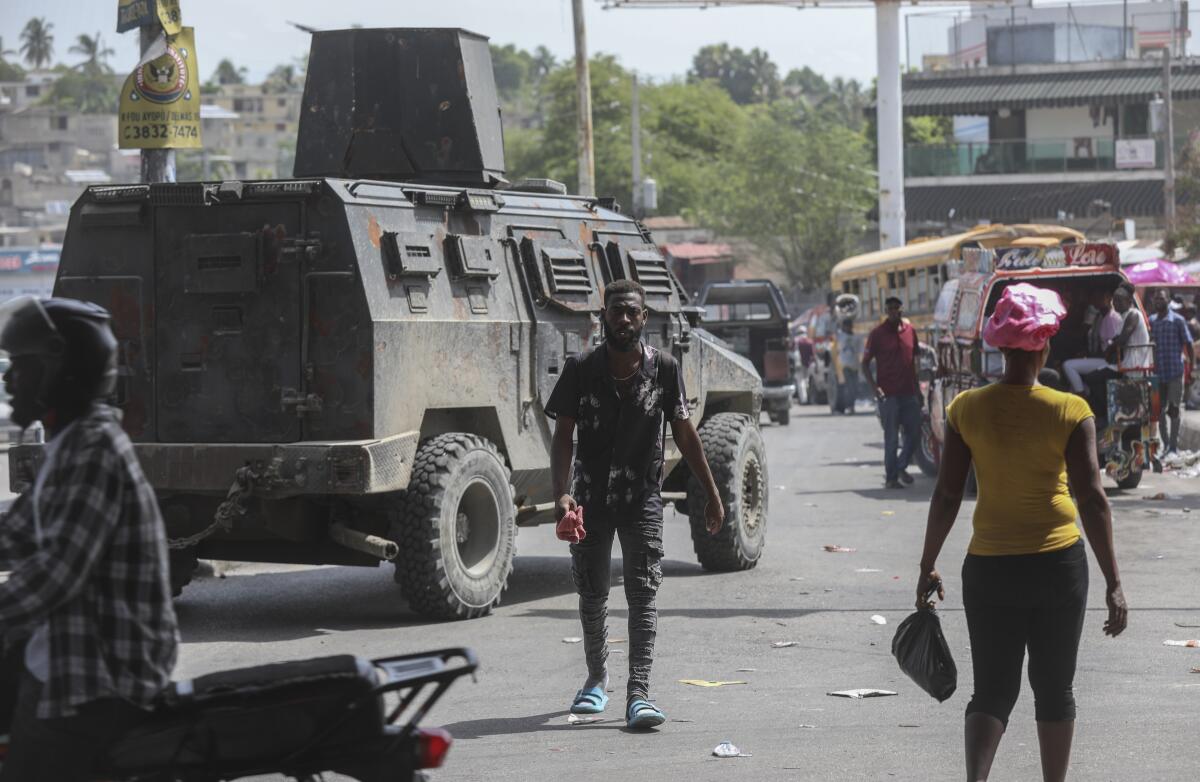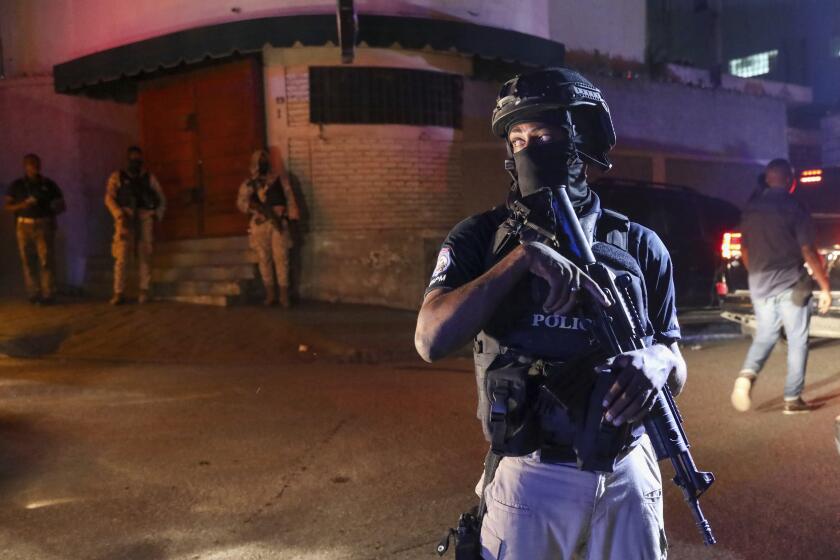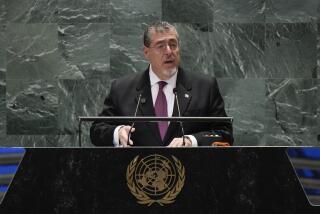200 additional Kenyan police arrive in Haiti in U.N.-backed mission to fight criminal gangs

- Share via
PORT-AU-PRINCE, Haiti — A second contingent of 200 police officers from Kenya arrived Tuesday in Haiti to bolster a U.N.-backed mission led by the East African country to battle violent gangs in the troubled Caribbean country.
The officers arrived nearly a month after the first contingent of 200 landed in the capital of Port-au-Prince, where gangs control at least 80% of the territory.
Last week the United Nations Security Council strongly condemned “the extreme levels of armed violence” in Haiti that are undermining peace, stability and security in the country and the region.
Authorities have declined to provide details on the Kenyans’ assignments, citing security concerns, although Associated Press journalists have seen them on patrol in areas near the main international airport, which reopened in late May after gang violence forced it to close for nearly three months.
The contingent of foreign police officers has arrived in Haiti nearly two years after the troubled Caribbean country urgently requested help to quell a surge in gang violence.
More Kenyans are expected to arrive in coming weeks and months and will be joined by police and soldiers from the Bahamas, Bangladesh, Barbados, Benin, Chad and Jamaica for a total of 2,500 personnel. They will be deployed in phases at a cost of some $600 million a year, according to the U.N. Security Council.
While some Haitians have welcomed the arrival of the Kenyans, others remain wary.
“The fear of the Haitians is that this mission, as has occurred in the past … will only achieve a temporary reduction in violence,” said Diego Da Rin, with the International Crisis Group, who was recently in Haiti.
Another concern is that Kenyan police have faced years of allegations of abuses in their country, including extrajudicial killings. Their behavior drew renewed scrutiny when they opened fire on protesters in recent weeks amid ongoing turmoil that has killed dozens of people.
William Ruto’s invitation to the White House marks the first state visit to the United States by an African leader in more than 15 years.
In addition, a previous intervention — the U.N.’s 2004-2017 peacekeeping mission — was marred by allegations of sexual assault and the introduction of cholera, which killed nearly 10,000 people.
Jean-Marc Etienne, 49, lost his home a year ago when gangs invaded his neighborhood, forcing him to flee like many others. He said he hasn’t seen Kenyans on patrol since the first contingent arrived in June.
“Security has not improved,” he said as he pushed a wheelbarrow full of raw sugarcane past a dusty road near the airport. “On top of that, kidnappings have started again.”
He and his family have been living in a friend’s yard under a tarp, exposed to sweltering heat and heavy rains as they seek a more secure shelter.
Life in Port-au-Prince becomes a game of survival, pushing Haitians to new limits as they scramble to stay safe and alive while gangs overwhelm police.
The Kenyan-led mission is meant to bolster Haiti’s National Police, which remains understaffed and underfunded, with only about 10,000 officers active at a time in a country of more than 11 million people.
The mission also aims to quell gangs accused of killing more than 4,450 people last year and injuring another 1,668, according to the U.N, more than double compared with the previous year.
In addition, more than 1,500 people were killed or injured in the first three months of this year.
Gangs also have left more than half a million Haitian homeless in recent years, and the level of violence has put some 1.6 million people at risk of starvation, according to the U.N. Office for the Coordination of Humanitarian Affairs.
Violence worsened earlier this year when gangs launched coordinated attacks in late February. They opened fire on the main international airport, stormed more than two dozen police stations and broke into Haiti’s two biggest prisons, releasing more than 4,000 inmates.
A new report from the U.N. migration agency says surging violence in Haiti from clashes with armed gangs has displaced nearly 580,000 people since March.
The attacks eventually led to the resignation of former Prime Minister Ariel Henry, who had urgently requested the deployment of foreign forces in October 2022.
His resignation in late April was followed by the appointment of a transitional presidential council and a new prime minister, Garry Conille.
Da Rin, with the International Crisis Group, warned that the Kenyan mission alone will not be sufficient to curb gang violence, noting that certain politicians and business owners have long been tied to gangs.
“As long as the problems of impunity and corruption are not addressed, any strategy focused solely on security will not have lasting improvements,” he said.
Sanon and Coto write for the Associated Press. Coto reported from San Juan, Puerto Rico.
More to Read
Sign up for Essential California
The most important California stories and recommendations in your inbox every morning.
You may occasionally receive promotional content from the Los Angeles Times.














